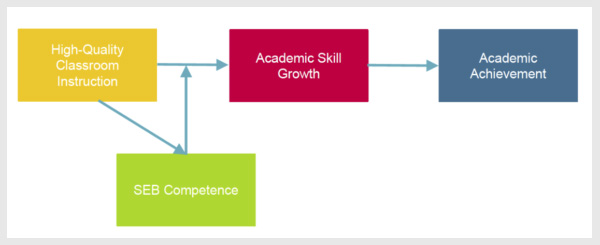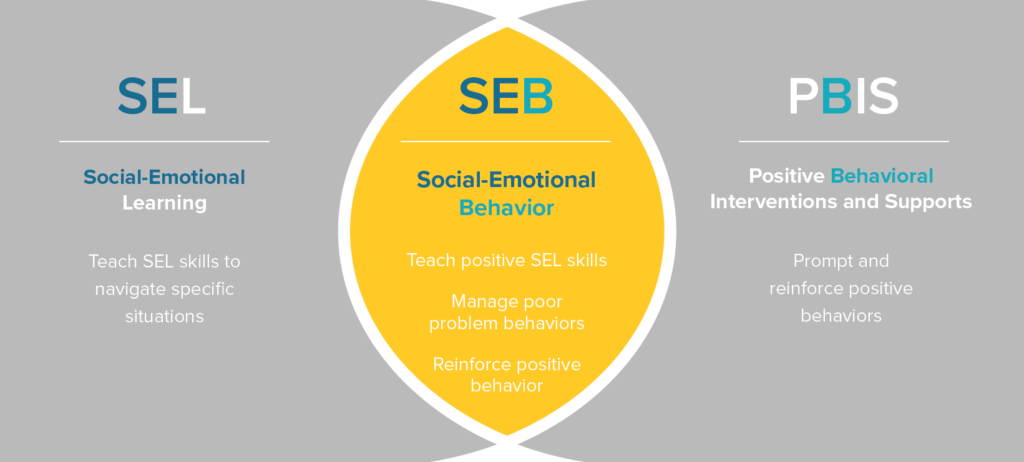August 5, 2020
In the past, a traditional school of thought held that K–12 students are successful in school if they’re successful academically. In other words, if students are demonstrating academic achievement, they’ll be “fine” overall.
More and more, however, researchers are pointing out the short-sightedness of this view. Recent research shows that students are more successful in school when they are also able to demonstrate social-emotional and behavioral (SEB) competence.
What does SEB competence involve? Let’s take a deeper look at this important concept in education.
Defining social-emotional behavior (SEB) competence
SEB competence is defined by the presence of social-emotional and academic enabling skills that help students learn and relate to others successfully. These skills include:
- Self-awareness
- Social awareness
- Self-management
- Relationship skills
- Responsible decision making
- Motivation
- Academic achievement
SEB competence is also defined by the absence of problem behaviors that prohibit learning and interfere with healthy relationships, such as:
- Aggression
- Noncompliance
- Disruption
- Worry or fear
- Withdrawal or avoidance
Social-emotional behavior competence as a protective factor
Research shows that SEB competence can serve as an important protective factor. In other words, students who are exposed to a number of risk factors, such as the limited availability of resources in the home and community, are more likely to achieve academically if they have demonstrated SEB competence.
As the following definition from Innis (2014) emphasizes, skills that are key to SEB competence—such as focus, persistence, and problem solving—are also essential for academic success, and for students’ well-being more generally:
“Social and emotional competence is a child’s ability to interact in a positive way with others, communicate feelings positively, and regulate behavior. Skills needed for healthy social and emotional development can include self-esteem, self-confidence, friend-making skills, self-control, persistence, problem solving, self-sufficiency, focus, patience, good communication skills, empathy, and knowing right from wrong. All of these skills play a critical role in a child’s overall wellbeing.”
Supporting the whole child
Discover Renaissance solutions for identifying students’ academic and SEB needs.
Social-emotional behavior competence as a mediator
SEB functioning is also an important mediator between high-quality instruction and students’ academic growth. How so? It is commonly assumed that high-quality classroom instruction will lead directly to academic skill growth and, eventually, to overall academic achievement.
Research tells us, however, that this isn’t necessarily the case for all students. Instead, educators can think of SEB competence as a mediator between instruction and achievement.
If students are struggling with an SEB skill, for instance…
- Not attending to instruction
- Not studying for quizzes and tests
- Struggling to get along with peers
- Struggling to effectively participate in academic groups; or
- Struggling to work independently and meet deadlines
…it will impede the student’s ability to access that high-quality instruction and build the academic skills over time that lead to mastery of grade-level standards. The relationship between SEB competence and academic skill growth can be represented as follows:

How is social-emotional behavior competence nurtured?
SEB competence is nurtured through a combined learning approach that addresses both social-emotional skills and behavior, often as part of a district’s multi-tiered system of support (MTSS). The following figure shows how SEB incorporates key elements of both social-emotional learning, or SEL, and a positive behavioral interventions and supports framework, or PBIS:

Why is it important to nurture social-emotional behavior competence?
Nurturing social-emotional and behavioral competence in all students is essential for several reasons:
- Academic success: As noted earlier, social-emotional and behavioral competence is strongly correlated with academic achievement. Students who have well-developed social-emotional and behavioral skills are better able to manage their emotions, focus on learning, and have positive interactions with teachers and peers, all of which contribute to academic success.
- Positive relationships: Social-emotional and behavioral competence is essential for building positive relationships with others. Students who have strong social-emotional and behavioral skills are better able to communicate effectively, resolve conflicts, and collaborate with others, which leads to positive social interactions and the development of healthy relationships.
- Mental health: Social-emotional and behavioral competence is closely tied to mental health and well-being. Students who have well-developed social-emotional and behavioral skills are better able to cope with stress, manage their emotions, and maintain positive relationships, all of which contribute to positive mental health outcomes.
- Life success: Social-emotional behavioral competence is essential for success in all areas of life, including relationships, work, and community involvement. Students who have strong social-emotional and behavioral skills are better equipped to navigate the challenges of life, make positive choices, and achieve their goals.
For these reasons, educators and caregivers must support the development of these skills in children and youth to help them reach their full potential.
How long does it take for children to develop social-emotional skills?
The development of social-emotional skills is a gradual process that occurs throughout childhood and adolescence. It is difficult to give a specific timeline for the development of these skills because it can vary widely from child to child and depends on factors such as:
- Individual temperament
- Life experiences
- Environmental factors
That being said, research suggests that children begin to develop social-emotional skills in the first year of life and continue to develop and refine these skills throughout childhood and adolescence. For example, infants start to develop the ability to recognize and respond to facial expressions and emotions, while toddlers begin to develop empathy and emotional regulation skills.
By preschool age, most children have developed the ability to recognize and label emotions and can use language to express their own emotions. During the elementary school years, children continue to develop their social-emotional skills, such as empathy, perspective-taking, and problem-solving.
During adolescence, social-emotional development shifts to focus on identity formation, peer relationships, and the development of more complex emotional regulation skills. However, adolescents are also more likely to experience social-emotional challenges, such as depression, anxiety, and social isolation.
While the timeline for the development of these skills can vary widely, it is important to provide children and youth with opportunities to develop and practice their social-emotional skills throughout childhood and adolescence.
Renaissance: Providing social-emotional behavior screening and whole child data
At Renaissance, we understand the importance of pinpointing students’ SEB needs while also understanding the effectiveness of your district’s SEL programming. For this reason, we’re proud to offer the Social, Academic, & Emotional Behavior Risk Screener (SAEBRS) for K–12 students.
SAEBRS is the only universal screener for SEB that has been demonstrated to meet the psychometric criteria established by the National Center on Intensive Intervention for convincing evidence of reliability, validity, and diagnostic accuracy.
To learn more about SAEBRS and other Renaissance solutions to support your students’ academic and social-emotional behavior success, connect with an expert today.

